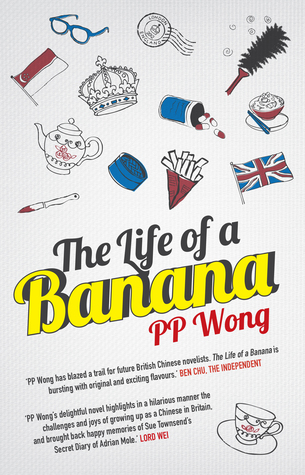I actually heard about this book in The Straits Times, so I was super excited. It's about British Born Chinese, the Chinese part coming from Singapore. I'll just say up front that my standards for this are probably higher than most other fiction I read, because I've been looking for awesome Singapore fiction. Plus, after that disastrous Singapore Lover book, I'm probably overly sensitive to depictions of Singapore and Singaporeans.
So dun say I complain too much hor. Like is like lah, but still must say bad things if got, right?
(And if you understood that, congrats, you understand Singlish. Or at least, what remains of Singlish after you study overseas for a few years :p)
The Life of a Banana is about Xing Li, a BBC (British-Born Chinese). One day, her mom passes away, and she and her older brother Lai Ker have to move in with their rich grandmother that they don't really know (or like). Living in the same house are Auntie Mei, a wannabe actress and Uncle Ho, who's strange. School isn't much better either, because she's getting picked on, and she has only one friend, a Jamaican-Chinese boy called Jay.
What I loved:
Xing Li's voice. It's fantastic, and it drew me in immediately. I don't really have much more to say about it, really, except that I love the voice. (This is short, but it's like, five stars for narrative voice, wheeee!)
The story: At first, I thought this was going to be a memoir-style story, where things happen to the author rather than her doing things in reaction to events. But, as I read on, I started getting more and more engrossed in the story. It may be the voice, but I think the story of growing up and finding out your identity starts to come out as the book progresses (and it helps that Xing Li starts being more proactive as the book goes on).
What I wasn't too keen on:
Any third-person narrative section. I think there were only two, and both of them were terrible, especially compared to how awesome the first person narrative voice was. When the book shifts to third person limited, the author seems to jump from one POV to another awkwardly, and it just comes across as... weird. The dialogue somehow becomes stiff: "I come from a poverty stricken background... you see, my foolish personality renders me to have a soft heart..." somehow becomes moving speech for the headmaster, who's been headmaster for forty years. I know you change your speech to the occasion, but this is strange.
Grandma's speech. Grandma speaks in broken English. At first, I thought it was because English isn't her native language, but then it's mentioned that she has "tons of brains", and (slight spoiler alert), she has friends who speak excellent English and write in said English with her. And I believe that friend and her grew up together, so why would one have good, standard English, and the other not? Please don't tell me it's just to emphasise the "foreignness", because it doesn't even read like Singapore-accented English to me. Like, even the old ah ma's in Singapore speak better English (those who can speak English, that is).
Others:
While we're on the topic of Singapore, I'm glad to say that while Singapore only appears for a few chapters, its portrayal was more accurate than that Singapore Lover book. For one thing, prata appears! I miss prata! And Milo Dinosaur and Milo Godzilla.
Oh, and I found it strange that while there was some Singlish (people explaining Singlish words), hardly anyone used Singlish in Singapore. Like, what? Lah appeared twice, meh appeared once as an example of Singlish, and lor not at all. Then again, I'd rather the author not mangle Singlish if she's not used to it. It's just something I found strange.
One more strange thing that isn't really a complaint is that I'm not sure how Xing Li gets into a club. I'm pretty sure we're strict about stuff like this, and she's not even in her teens, but I might have misread that chapter, or mistook her age because the voice sounded so young.
Overall, this was way better than Singapore Lover. It's not the perfect book, but I did enjoy it, despite my complaints (then again, it is said that one of the Singaporean past-times is complaining. The other is queueing).
Disclaimer: I got a free copy of this book from the publisher via NetGalley in exchange for a free and honest review.
P.s. The author has this website for Asian writers called "Banana Writers - Where Asian Writers Get Unpeeled". Am I the only one who took the term "Banana" in the context of the novel and thought it meant "helping Asian writers become more Western"?


No comments :
Post a Comment
I really do appreciate all comments, and I'll try my best to reply within 24 hours!
^_^